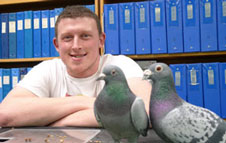 Monday 17 June 2019 12:34pm
Monday 17 June 2019 12:34pm Dr Damian Scarf
Dr Damian Scarf
University of Otago scientist Dr Damian Scarf has won a $50,000 grant for his novel research project which will see pigeons tested for cognitive abilities in a free-range environment, rather than in a laboratory.
The Senior Lecturer in the Department of Psychology is the recipient of the National Animal Ethics Advisory Committee (NAEAC)'s inaugural Aotearoa New Zealand 3Rs Research Award, which supports a research project specifically targeting the refinement, reduction or replacement of animals used in research.
The aim of the project is to develop a free-range learning apparatus for pigeons which will enable comparative cognition research to be conducted in a setting where the pigeons can display their natural patterns of behaviour.
Dr Scarf explains that pigeons are a vital tool in providing information about the abilities of humans' distant ancestors. Comparative cognition research provides some of the few research methods to investigate the cognitive abilities of our early human ancestors. This, in turn, provides insight into the building blocks of our advanced cognitive abilities.
“Our work suggests their cognitive abilities are also on par with primates, meaning we can investigate complex cognitive abilities. In one study we demonstrated that pigeons could learn abstract numerical rules and apply them in novel situations, tapping the evolutionary origins of our profound mathematical abilities,” Dr Scarf says.
“In another, we investigated the origins of human word learning and pigeons not only correctly identified novel words, but also displayed the hallmarks of orthographic processing.”
Dr Scarf's novel approach will ultimately shift the research out of the laboratory and into a free-range setting.
“For comparative cognition research, animals are typically housed and tested in a lab environment, this project will allow the animals to come and go as they please.”
He is excited about receiving the award. “I have had this idea in my mind for the past five years and it is great to get the support that will allow me to see it to fruition.”
The Chair of the NAEAC, Grant Shackell, says the 3Rs award promotes the reduction and replacement of animals used in research, testing and teaching, and the refinement of experimental techniques to minimise pain or distress.
“Dr Scarf's proposal will simply, yet fundamentally, change the way pigeons are trained to undertake tasks that require learning and memory.
“This refinement of a methodology that has remained largely unchanged since the 1930s will have a significant positive welfare impact on the animals.”
University of Otago Deputy Vice-Chancellor, Research and Enterprise, Professor Richard Blaikie congratulates Dr Scarf on his success.
“This is a positive demonstration of our researchers' commitment to the 3Rs, and we look forward to seeing the benefits come when the research is put into practice”.
For further information, contact:
Dr Damian Scarf
Senior Lecturer, Department of Psychology
Email damian.scarf@otago.ac.nz
Liane Topham-Kindley
Senior Communications Adviser
Tel +64 3 479 9065
Mob +64 21 279 9065
Email liane.topham-kindley@otago.ac.nz
FIND an Otago expert
Use our Media Expertise Database to find an Otago researcher for media comment.
